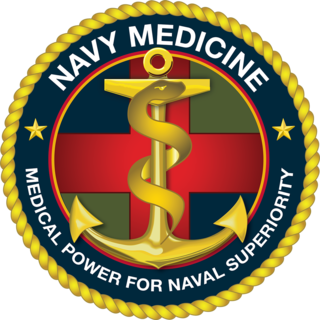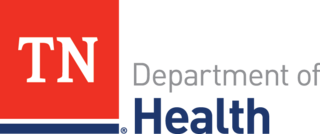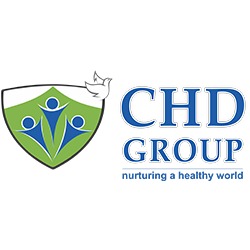
The Centers for Disease Control and Prevention (CDC) is the national public health agency of the United States. It is a United States federal agency under the Department of Health and Human Services, and is headquartered in Atlanta, Georgia.
Health Canada is the department of the Government of Canada responsible for national health policy. The department itself is also responsible for numerous federal health-related agencies, including the Canadian Food Inspection Agency (CFIA) and the Public Health Agency of Canada (PHAC), among others. These organizations help to ensure compliance with federal law in a variety of healthcare, agricultural, and pharmaceutical activities. This responsibility also involves extensive collaboration with various other federal- and provincial-level organizations in order to ensure the safety of food, health, and pharmaceutical products—including the regulation of health research and pharmaceutical manufacturing/testing facilities.

The U.S. Army Medical Command (MEDCOM) is a direct reporting unit of the U.S. Army that formerly provided command and control of the Army's fixed-facility medical, dental, and veterinary treatment facilities, providing preventive care, medical research and development and training institutions. On 1 October 2019, operational and administrative control of all military medical facilities transitioned to the Defense Health Agency.

The Medical University of South Carolina (MUSC) is a public medical school in Charleston, South Carolina. It opened in 1824 as a small private college aimed at training physicians and has since established hospitals and medical facilities across the state. It is one of the oldest continually operating schools of medicine in the United States and the oldest in the Deep South.
The Joint Commission is a United States-based nonprofit tax-exempt 501(c) organization that accredits more than 22,000 US health care organizations and programs. The international branch accredits medical services from around the world.
UConn Health is a healthcare system and hospital, and branch of the University of Connecticut that oversees clinical care, advanced biomedical research, and academic education in medicine. The system is funded directly by the State of Connecticut and the University’s financial endowment. Its primary location, UConn John Dempsey Hospital, is a teaching hospital located in Farmington, Connecticut, in the US. In total, UConn Health comprises the hospital, the UConn School of Medicine, School of Dental Medicine, and Graduate School. Additional community satellite locations are located in Avon, Canton, East Hartford, Putnam, Simsbury, Southington, Storrs, Torrington, West Hartford, and Willimantic, including two urgent cares in both Storrs and Canton. Uconn Health also owns and operates many smaller clinics around the state that contain UConn Medical Group, UConn Health Partners, University Dentists and research facilities. Andrew Agwunobi stepped down as the CEO of UConn Health in February 2022 after serving since 2014 for a private-sector job. Bruce Liang is UConn Heath's interim CEO and remains dean of the UConn School of Medicine.

The New York City Department of Health and Mental Hygiene is the department of the government of New York City responsible for public health along with issuing birth certificates, dog licenses, and conducting restaurant inspection and enforcement. The New York City Board of Health is part of the department. Its regulations are compiled in title 24 of the New York City Rules. Since March 2022, the commissioner has been Ashwin Vasan.
Allied health professions (AHPs) are a group of health care professions that provide a range of diagnostic, technical, therapeutic, and support services in connection with health care, and which are distinct from the fields of dentistry, medicine, nursing and pharmacy.
Health and Social Care (HSC) is the publicly funded healthcare system in Northern Ireland. Although having been created separately to the National Health Service (NHS), it is nonetheless considered a part of the overall national health service in the United Kingdom. The Northern Ireland Executive through its Department of Health is responsible for its funding, while the Public Health Agency is the executive agency responsible for the provision of public health and social care services across Northern Ireland. It is free of charge to all citizens of Northern Ireland and the rest of the United Kingdom.

In medicine, rural health or rural medicine is the interdisciplinary study of health and health care delivery in rural environments. The concept of rural health incorporates many fields, including wilderness medicine, geography, midwifery, nursing, sociology, economics, and telehealth or telemedicine.

The Bureau of Medicine and Surgery (BUMED) is an agency of the United States Department of the Navy that manages health care activities for the United States Navy and the United States Marine Corps. BUMED operates hospitals and other healthcare facilities as well as laboratories for biomedical research, and trains and manages the Navy's many staff corps related to medicine. Its headquarters is located at the Defense Health Headquarters in Fairfax County, Virginia. BUMED has 41,930 medical personnel and more than a million eligible beneficiaries.
The Oklahoma State Department of Health (OSDH) is a department of the government of Oklahoma under the supervision of the Oklahoma Secretary of Health. The department is responsible for protecting the health of all Oklahomans and providing other essential human services. The OSDH serves as the primary public health protection agency in the state.

A healthcare center, health center, or community health center is one of a network of clinics staffed by a group of general practitioners and nurses providing healthcare services to people in a certain area. Typical services covered are family practice and dental care, but some clinics have expanded greatly and can include internal medicine, pediatric, women’s care, family planning, pharmacy, optometry, laboratory testing, and more. In countries with universal healthcare, most people use the healthcare centers. In countries without universal healthcare, the clients include the uninsured, underinsured, low-income or those living in areas where little access to primary health care is available. In the Central and East Europe, bigger health centers are commonly called policlinics.
The Denver Department of Environmental Health (DEH) is a charter-established department of the City & County of Denver. DEH includes five divisions:

In the past, Kosovo’s capabilities to develop a modern health care system were limited. Low GDP during 1990 worsened the situation even more. However, the establishment of the Faculty of Medicine in the University of Pristina marked a significant development in health care. This was also followed by launching different health clinics which enabled better conditions for professional development.

The Tennessee Department of Health (TDH) is the primary agency of state government in Tennessee responsible for public health. Its workforce provides a variety of direct and indirect services to residents and visitors in all 95 counties of the state.

The Division of Industrial Hygiene was a division of the U.S. Public Health Service (PHS) with responsibility for occupational safety and health programs. It existed from 1914 until 1971, when it became the National Institute for Occupational Safety and Health (NIOSH). It had several names during its existence, most notably the Office of Industrial Hygiene and Sanitation in its earlier years and the Division of Occupational Health during its later years.

The COVID-19 pandemic has revealed race-based health care disparities in many countries, including the United States, United Kingdom, Norway, Sweden, Canada, and Singapore. These disparities are believed to originate from structural racism in these countries which pre-dates the pandemic; a commentary in The BMJ noted that "ethnoracialised differences in health outcomes have become the new normal across the world" as a result of ethnic and racial disparities in COVID-19 healthcare, determined by social factors. Data from the United States and elsewhere shows that minorities, especially black people, have been infected and killed at a disproportionate rate to white people.

CHD Group is an Indian non-profit global health organisation headquartered in Mangalore. Founded in 2014, CHD Group works in the field of public health, disaster management, primary healthcare, road safety, women's health, skill development, monitoring and evaluation of programmes, implementing CSR programmes for corporate companies and livelihood for rural communities and partners with other Indian and foreign organisations, government ministries, diplomatic missions, United Nation agencies for capacity development, supportive supervision, technical support, CSR programme implementation and strengthening public health systems.
The Australian Health Practitioner Regulation Agency (AHPRA), infrequently spelt as the Australian Health Practitioners Regulation Agency is a statutory authority founded in 2010 which is responsible, in collaboration with the Medical Board of Australia, for registration and accreditation of health professionals as set out in the Australian legislation called the National Registration and Accreditation Scheme. As of 2018, approximately 586,000 health professionals were registered with the AHPRA, containing 98,400 medical practitioners (which includes general practitioners, medical specialists and some hospital workers), and 334,000 nurses and midwives. This rose to 825,720 registered health professionals in 2021.











